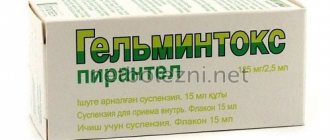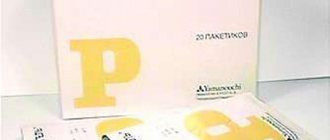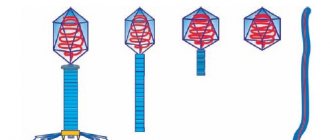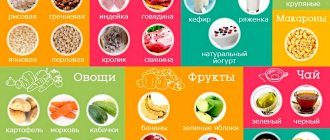pharmachologic effect
Manufacturer: BALKANPHARMA (Bulgaria)
Release form: suspension for oral administration
Active ingredient: aluminum hydroxide, magnesium hydroxide
Analogs: Rennie, Motilium, Almakson
Almagel is a medicine that actively reduces the increased acidity of gastric juice and reduces the activity of pepsin.
The drug has an analgesic, adsorbent and enveloping effect, protecting the gastric mucosa from damaging factors and the action of hydrochloric acid.
Sorbitol, which is part of Almagel, as an additional ingredient, gives a moderate choleretic and laxative effect, and also helps reduce intestinal bloating.
The effect of the drug and its composition
Almagel A is a white, opaque suspension with a lemon tint. During long-term storage, the contents separate into an upper transparent part and a lower white and thick part. It is important to shake the bottle before use so that the contents of the mixture are homogeneous.
The main composition includes the following compounds (per 5 ml of medicine):
- algeldrat (aluminum hydroxide gel) – 2.18 g,
- magnesium hydroxide paste – 350 mg,
- benzocaine – 75 mg,
- auxiliary components, including ethanol (96%) and water, with which the contents of the suspension are brought to 5 ml.
The drug Almagel A is an antacid drug in combination with a local anesthetic (reduces the sensitivity of nerve endings). The action of this remedy is combined. It not only neutralizes the effect of hydrochloric acid, one of the components of gastric juice, but also relieves pain. It has an enveloping effect, so there is no damage or irritation to the mucous membrane.
Important! The medicine acts gradually, reducing the acidity level to the optimal concentration due to the distribution of the components evenly over the surface of the gastric mucosa. In this case, CO2 is not formed, which causes a feeling of heaviness, flatulence and repeated secretion (release) of hydrochloric acid.
Each of the components acts in a specific way:
- Aluminum hydroxide reduces the formation of pepsin (an enzyme in gastric juice) and, through chemical interaction, reduces the amount of hydrochloric acid;
- Magnesium hydroxide, due to its conversion into magnesium chloride, also relieves the effects of acid on the walls of the stomach and esophagus;
- benzocaine can lower the pain threshold, which is important for severe pain;
- sorbidol, which is part of the auxiliary compounds, is aimed at the active separation of bile and has a weak laxative effect.
The medicine is not absorbed into the gastrointestinal tract and acts long-lasting and evenly, without affecting metabolism or causing disruption. It does not promote alkalosis (acidification) and the formation of sand and stones in the urinary tract.
Indications for use are short-term inflammation of the gastrointestinal tract with erosive processes, which manifest themselves in the form of pain, nausea, and vomiting; the process of acute or chronic inflammatory processes on the mucous membranes of the gastrointestinal tract. Considering the structural features of the esophageal mucosa, gastroenterologists recommend using this particular drug.
Indications for use
Almagel is used in the treatment of various gastrointestinal diseases. Indications for use of the drug are the following pathologies of the digestive system:
- gastric and duodenal ulcers in the acute stage;
- acute or chronic gastritis with normal or hypersecretion in the acute phase;
- reflux esophagitis;
- duodenitis;
- diaphragmatic hernia;
- gastrointestinal disorders due to poor eating habits or bad habits.
Does Almagel treat or relieve symptoms of the disease?
It has medicinal properties and can be part of complex therapy for these diseases.
Maalox
A drug from the group of antacids with a combination of simple metal salts. Produced by a French pharmaceutical company. Analogous to Almagel in composition.
Composition and dosage form
The active components of the drug are aluminum and magnesium hydroxides in almost equal concentrations. Excipients: citric acid, peppermint oil, methylparaben, sorbitol, saccharin, purified water.
It comes in the form of a creamy suspension similar to milk. Sweet in taste, has a mint aroma.
Indications for use
Maalox is indicated for the treatment of heartburn, as well as gastric acidity disorders and accompanying digestive disorders. It is used in the treatment of children over fifteen years of age and adults.
Contraindications
Prohibited for use in case of severe kidney dysfunction, as well as in case of a known allergic reaction to the components of the drug. Not prescribed for Alzheimer's disease, constipation, chronic diarrhea, severe abdominal pain without specifying the cause of the pain.
Adverse reactions
Excessive dosages or long-term treatment with the drug, as well as standard dosages for patients with a diet depleted of phosphorus, can lead to the development of phosphorus deficiency in the body. The process manifests itself in hypercalciuria, osteomalacia, and the risk of developing osteoporosis increases.
Gastrointestinal disorders may develop, including constipation and diarrhea, as well as angioedema, skin rashes, hypersensitivity and anaphylactic reactions.
Overdose
In patients who do not suffer from kidney dysfunction, overdoses of magnesium do not cause serious poisoning. Patients with pathologies in the kidneys may develop magnesium intoxication.
Symptoms of intoxication include nausea, hypotension, muscle paralysis, slow reflexes, drowsiness, and abnormal electrocardiogram readings. In severe cases of intoxication, comatose states may develop.
Treatment of intoxication is carried out with intravenous administration of calcium gluconate. In case of functional renal failure, the use of an artificial kidney apparatus is required.
Almagel - instructions for use
According to the instructions for use, Almagel is used in therapeutic practice in the following dosages:
- adult patients - from 1 to 3 dosage spoons up to 4 times a day. For maintenance treatment, the dose is 1 spoon 3-4 times a day for 2-3 months;
- for children under 10 years of age - 1/3 of the dose for an adult patient, and for adolescents, the dosage will be half the volume and only strictly as prescribed by the doctor.
The maximum dose of the drug is 16 spoons per day. The duration of treatment at this dosage should be no more than 14 days.
If heartburn occurs, is it possible or not to use Almagel during pregnancy to relieve it?
Yes, you can, but in a short course, no more than 3-4 days after consulting a gynecologist.
Take Almagel before or after meals
Before using the drug, the suspension must be thoroughly mixed by shaking the package.
Is it better to take it before or after meals? You need to take the medicine 30–40 minutes before meals and at night. When treating peptic ulcers, Almagel is taken between breakfast and lunch or lunch and dinner.
Storage conditions and shelf life
You can buy antacid medications without a prescription. It is sold in volumes of 170 or 200 ml in glass or polypropylene bottles with measuring spoons, which are packed in cardboard boxes.
The drug should be stored at a temperature from +5 to +15C, but not higher than +25C. Protection from sunlight is important, so it is better if the suspension is in a box. If the medicine is frozen, it can no longer be used.
The shelf life is on average from 2 to 5 years (read the packaging). Naturally, after this period the medicine is not used.
Almagel analogues
How to replace Almagel, if not all patients who have, in addition to gastrointestinal diseases, concomitant pathologies of internal organs, can be prescribed the drug. In this case, Almagel analogues, which are presented in the form:
- generics;
- synonyms;
- medications that have a combined composition with an equivalent mechanism of action.
Analogs and substitutes for Almagel, offered by the pharmacy chain, enable the doctor to select the appropriate drug specifically, taking into account the concomitant pathology.
Table of Almagel analogues with prices and country of origin
| Analogue | Cost in rubles | Manufacturer country |
| Relzer | 320-350 | India |
| Pepsan | 480-510 | France |
| Phosphalugel | 210-425 | Netherlands |
| Enterosgel | 390-470 | Russia |
| Motilium | 750-780 | Russia |
| Rennie | 310-330 | Russia |
| Iberogast | 700-830 | Switzerland |
A large selection of Almagel substitutes significantly increases the doctor’s ability to approach the selection of medications, taking into account contraindications and their mechanism of action.
The list of Almagel analogues can be supplemented with a number of other drugs. Among them there are Almagel substitutes that are cheaper and more expensive, both imported and Russian, which include:
- Almagel A;
- Almagel Neo;
- Almakson;
- Hephalus;
- Gastal;
- Gaviscon
Gastroenterologists actively use Almagel analogues to treat not only organic diseases (ulcers, erosion, gastritis), but also functional pathologies accompanied by dyspeptic symptoms.
Relzer
Manufacturer: GLENMARK PHARMACEUTICALS Ltd (India)
Release form: oral suspension
Active ingredients: aluminum hydroxide, magnesium hydroxide, simethicone, licorice root powder
An analogue of Almagel belongs to antacid drugs with an ingredient that reduces flatulence. Relzer has the ability to neutralize free hydrochloric acid in the stomach, which leads to a decrease in pepsin activity.
As a result of the enveloping effect of the analogue on the gastric mucosa, the influence of negative factors is reduced. Under the influence of the drug, inflammation is stopped and the ulcerative process in the stomach and duodenum is healed.
An analogue of Almagel Relzer is taken by adults and adolescents from 15 years old, 1-2 teaspoons 3-4 times a day, by children from 10 to 15 years old - ½ dose of an adult patient. The course of treatment is 2 weeks, which can be extended according to indications.
Pepsan
Manufacturer: ROSA PHOTOPHARMA (France)
Release form: gel, capsules for oral administration
Active ingredient: dimethicone, guaiazulene
Pepsan is a combination drug. The Almagel analogue has a pronounced anti-inflammatory effect, which results in active regenerative processes. Under the influence of the analogue, a protective film is formed on the gastric mucosa, which protects it from an aggressive acidic environment.
The drug is active in the following gastrointestinal pathologies:
- gastralgia;
- early stage reflux disease;
- high acidity of gastric juice;
- dyspeptic disorders in the form of heartburn, belching, flatulence, nausea, which are functional in nature
Take the analogue of Almagel Pepsan, 1 capsule or sachet 2-3 times a day. The duration of the course of treatment is determined by the doctor individually.
Phosphalugel
Manufacturer: ASTELLAS (Netherlands)
Release form: gel for oral administration
Active ingredient: aluminum phosphate gel 20%
The analogue Phosphalugel belongs to the group of antacids that neutralize hydrochloric acid and reduce the activity of pepsin. The drug does not cause disturbances in the acid-base balance of the body and has good adsorption capacity.
The result of this process is the formation of a protective film on the gastric mucosa, protecting the organ from the effects of negative factors. Phosphalugel is taken orally by adults and children over 6 years of age, 1-2 packets 2-3 times a day before or after meals, depending on the form of the gastrointestinal tract disease.
Enterosgel
Manufacturer: FARMASIL LLC (Russia)
Release form: paste for oral administration
Active ingredient: polymethylsiloxane polyhydrate
Almagel analogue Enterosgel belongs to the pharmacological group of drugs with enterosorbing action, which has a pronounced detoxification effect. The drug has the ability to bind and remove toxic substances, various poisons, and food allergens from the body.
This analogue of Almagel has the ability to restore beneficial intestinal microflora, remove products of metabolic metabolism, without affecting the absorption of vitamins and microelements. It is indicated for various acute and chronic intoxications of the body.
Enterosgel is taken diluted in a triple volume of water for adults, 1-1.5 tbsp. spoons 3 times a day. For children, depending on age, from ½ teaspoon for infants up to 1 year old up to 6 times a day before each feeding and up to 1 tbsp. spoons 3 times a day from 5 to 14 years according to the instructions.
Motilium
Manufacturer: JOHNSON & JOHNSON (Russia)
Release form: lozenges, oral suspension
Active ingredient: domperidone
Motilium is prescribed as a remedy that helps eliminate dyspeptic symptoms caused by esophagitis or reflux disease, which manifest themselves in the form of:
- nausea, vomiting;
- belching, heartburn;
- a feeling of heaviness and fullness in the stomach, bloating;
- pain in the epigastric region.
An analogue of Almagel Motilium relieves discomfort and symptoms of indigestion, activating the motility of the upper gastrointestinal tract. The drug is taken orally a quarter of an hour before meals, 1 tablet 3 times a day. According to indications, the dosage can be doubled.
In pediatric practice, the drug is used in the form of a suspension and for children weighing over 35 kg. The dosage of the analogue is calculated according to the instructions.
Rennie
Manufacturer: BAYER (Russia)
Release form: chewable tablets
Active ingredient: calcium carbonate, magnesium carbonate
Rennie belongs to the pharmacological group of antacid drugs. This analogue of Almagel has the ability to quickly stop excess hydrochloric acid in gastric juice, ensuring its neutralization for a long time.
Relief of dyspeptic symptoms, the appearance of which is due to increased secretory activity of gastric juice, occurs 3–5 minutes after taking the analogue. The Rennie analogue is taken by sucking 1-2 tablets until they are completely dissolved. If necessary, the dosage of the drug can be increased to a maximum daily dose of 11 tablets.
Iberogast
Manufacturer: BAYER (Switzerland)
Release form: drops for oral administration
Active ingredient: extracts from herbal products
Iberogast is a herbal remedy that has a pronounced anti-inflammatory and antispasmodic effect. The analogue actively eliminates spasm of the smooth muscles of the gastrointestinal tract without affecting normal peristalsis.
The drug effectively eliminates dyspeptic symptoms in functional disorders of the digestive system. As part of complex therapy, it can be used to treat gastritis, gastric ulcer and duodenal ulcer. The drug Iberogast is taken 20 drops three times a day with a small amount of water, for up to 1 month.
Composition of the drug
The active ingredients are aluminum and magnesium hydroxide in the form of a gel and paste in terms of oxide forms. Auxiliary components are sorbitol, cellulose derivatives, hydroxybenzoate, sodium saccharin, alcohol, purified water.
Dosage form
Almagel is dispensed in the form of an oral suspension with a dispenser. The suspension is white, a transparent layer may form, shaking before use is required.
Indications
Prescribed for diseases accompanied by excessive acidity of digestive juice, including hiatal hernia, esophagitis, reflux esophagitis, acute and chronic gastritis, gastroduodenitis, and peptic ulcers.
Contraindications
Prohibited for use for constipation, Alzheimer's disease, severe abdominal pain of unknown origin. Do not take if you suspect appendicitis or ulcerative colitis. Prohibited for use in cases of severe renal failure, hypophosphatemia, diarrhea.
Prohibited for use while breastfeeding a child.
Adverse reactions
The digestive tract may react to taking Almagel with constipation, diarrhea, discoloration of stool, and nausea. Hypophosphatemia may develop, manifested by poor appetite, weight loss, and muscle weakness.
Possible disturbances in the functioning of the kidneys and urinary tract, including nephrocalcinosis. With long-term treatment, the development of osteoporosis and osteomalacia, decreased blood pressure, and hyporeflexia is possible. Laboratory indicators may indicate microcytic anemia, intoxication with magnesium and aluminum, and their excessive concentrations in the blood.
Overdose
A one-time accidental overdose of the drug does not manifest itself in anything other than flatulence and constipation. There may be a metallic taste in the mouth. Long-term overdoses are fraught with the deposition of kidney stones, severe constipation, drowsiness, changes in mental activity and mood, and nervousness.
Almagel or Phosphalugel - which is better?
Manufacturer: ASTELLAS (Netherlands)
Release form: gel for oral administration
Active ingredient: aluminum phosphate gel 20%
Both drugs belong to the pharmacological group of antacids and are used to treat gastrointestinal diseases accompanied by dyspeptic disorders. Almagel and its analogue are effective in eliminating the pathological symptoms of diseases of the digestive system, but there is a difference between them. The advantage of Phosphalugel is:
- budget cost;
- permission for use in any age group of patients;
- pregnant women and during lactation;
- restoration of normal intestinal function.
For gastritis accompanied by pain, Almagel will be the best, since pain relief when taking it occurs in a short time. For reflux, therapy is best carried out with Phosphalugel, since when it is used, there is no “ricochet” effect, that is, repeated increased secretion of gastric juice.
In case of an ulcerative process for the stomach, Almagel will be the best, which not only protects the damaged mucous membrane, but also normalizes the movement of the food bolus throughout the intestine. According to reviews from doctors and patients, both drugs give a good effect. The priority in choosing it remains with the doctor, since the treatment is prescribed taking into account all the nuances of the patient’s body.
Alumag
The drug complements the list of cheap analogues of Almagel, despite foreign production, since Alumag is produced by a Polish pharmaceutical plant. Belongs to the group of antacids with a combination of simple salts for the treatment of acidity pathologies.
Composition of the drug and dosage form
One tablet contains 0.2 g of magnesium and aluminum hydroxides. Auxiliary components include starch, gelatin, sorbitol, magnesium stearate, and peppermint oil.
Available in the form of white tablets with a rounded shape, biconvex, on one side there is an engraving with the name of the drug in Latin.
Who is the drug prescribed to?
Indicated to eliminate the symptoms of pathologies of the stomach and intestines, including discomfort, bloating, flatulence, belching, heartburn. It is used for reflux esophagitis, gastritis, and esophageal hernia. It is used as an auxiliary component in the treatment of peptic ulcers.
Who is prohibited from using
Since the concentrations of active ingredients in this drug are lower than in other Almagel analogues, contraindications are limited. Strict contraindications include severe functional kidney disorders, a known allergic reaction to the components of the drug and children under 16 years of age.
Side effects
Typically, this analogue of Almagel is well tolerated by patients.
Occasionally, undesirable reactions from the digestive system were observed - stool lightening, vomiting, constipation and diarrhea, accompanied by nausea. Skin allergic reactions cannot be excluded. With long-term use, a decrease in the body's phosphorus reserves is possible.
Overdose
Cases of acute overdoses have not been recorded. With long-term treatment, syndromes of increased concentrations of magnesium and aluminum in the blood serum may develop.
Almagel or Maalox – which is better?
Manufacturer: SANOFI-AVENTIS (France)
Release form: suspension for oral administration
Active ingredient: algeldrate, magnesium dioxide
The drugs contain different ingredients and active substances. Both medications actively relieve the pathological symptoms of gastrointestinal diseases.
For gastritis accompanied by pain, the best to use is Almagel, which quickly relieves it.
If the patient has intestinal dysfunction, accompanied by constipation or periodic diarrhea, Almagel will be more effective in therapy.
Almagel or Gaviscon - which is better?
Manufacturer: RECKITT BENCKISER HEALTHCARE (UK)
Release form: chewable tablets
Active ingredient: sodium alginate, sodium bicarbonate, calcium carbonate
Gaviscon is an antacid. When the drug is taken orally, it enters into a chemical reaction with the acidic contents of the stomach, resulting in the formation of an alginate gel, the pH of which is close to neutral.
The gel forms a protective film over the food bolus in the stomach, which prevents the development of gastroesophageal reflux, that is, the reflux of gastric contents into the esophagus.
Treatment with the Gaviscon analogue will be more effective for reflux, since this drug was developed directly for this type of gastrointestinal pathology. Almagel is more suitable for the treatment of ulcerative processes of the stomach and duodenum.
Almagel or De Nol
Manufacturer: ASTELLAS (Netherlands)
Release form: tablets
Active ingredient: bismuth tripotassium dicitrate
Denol, like Almagel, is used to treat gastric and duodenal ulcers, chronic gastritis and gastroduodenitis.
The use of a De-Nol analogue in therapy will be preferable if the ulcerative or inflammatory process is associated with bacterial infection by Helicobacter pylori.
Almagel or Omez
Manufacturer: Dr.
Reddy,s (India) Release form: capsules
Active ingredient: omeprazole
Both drugs are prescribed for the treatment of gastric and duodenal ulcers, reflux esophagitis. In case of exacerbation of the process, Almagel will be the best drug, since it quickly relieves pain and reduces discomfort, compared to the mechanism of action of the Omez analogue.
If treatment is prescribed to children, preference should be given to Almagel, since according to the instructions, the drug is approved for use from 10 years of age, and its analogue - from 18 years of age.
Analogues of the drug
Almagel, like most drugs, has analogues that are also used to treat the esophagus and stomach. The effect of their use is associated with the similarity of composition: the main active ingredient is also aluminum and magnesium hydroxide.
Analogues of Almagel include Maalox, Almol, Gastal, Coagel, Maalukol, Phospholugel, Gastratsid. If the average price for Almagel ranges from 215 to 260 rubles, then analogues are mostly cheaper. Let's give examples of some of the tools.
Maalox is the most common and effective drug compared to other analogues. It provides effective relief from heartburn and is allowed during lactation and kidney disease (with caution). Children can only be taken from 12 years old. Contains aluminum hydroxide in large proportions, which helps avoid constipation. The disadvantage is the high price, the upper limit of which is 700 rubles.
Almol is available in the form of a gel, suspension and chewable tablets for heartburn. Effective for gastritis, gastric and duodenal ulcers, reflux esophagitis. The antacid, adsorbing, enveloping effect is pronounced. Neutralizes the effect of hydrochloric acid, reducing its content in gastric juice.
Maalukol is much cheaper than other analogues. The main component is magnesium hydroxide. Allowed for children from 4 months of age. Can be used during pregnancy and lactation, but not more than 3 days. Long-term use is undesirable, as it causes vomiting and constipation. Has a carminative effect. The advantages include different forms of release, minor age restrictions and a wide spectrum of action.
Phospholugel has the same therapeutic effect, but has much fewer contraindications. Approved for use from infancy. Reacting with hydrochloric acid, aluminum hydroxide forms salt, slowing down the process of food digestion. Available in gel form. It's inexpensive.
Gastracid also refers to antacid drugs. Available in the form of tablets, suspension and gel. Indications and contraindications are similar to Almagel. The average cost is 100 rubles, so it is suitable for different social strata of the population. They replace Almagel after the recommendation of a doctor. The disadvantages include a short-term effect on heartburn.
Important! There are analogues, the composition of which differs from the above-mentioned drugs, but their effect is not inferior to Almagel. These include Gaviscon, Rennie, Inalan.
Almagel or Gastal
Manufacturer: Teva (Israel)
Release form: lozenges
Active ingredient: magnesium hydroxide, aluminum hydroxide-magnesium carbonate gel
According to their mechanism of action, both drugs are equivalent. But Almagel is available in liquid form, as a suspension. It better envelops the gastric mucosa, protecting it from the effects of an aggressive environment and negative factors.
The analogue of Gastal, in the form of a lozenge, will be convenient to take if the patient is away from home.
Gastracid
A complex drug prescribed for organic and functional pathologies of the digestive tract. Cheap analogue of Almagel with a low price. Produced by a Dutch pharmaceutical company, it is available over-the-counter from pharmacies.
Components of the drug
The active components of the drug are aluminum and magnesium hydroxides, 0.4 g each. Excipients include mannitol, sorbitol, purified water and others.
Dosage form
Available in the form of chewable tablets. One package contains twenty tablets with mint flavor. One blister can contain six or ten tablets.
Who is prescribed
The use of the drug is indicated for ulcerations of the duodenal mucosa or gastric endothelial mucosa, especially during exacerbation. Indicated for inflammatory exacerbations of the stomach, inflammatory changes in the intestines, hernia, reflux esophagitis.
It is used to eliminate discomfort and symptomatic treatment of the gastrointestinal tract with belching, heartburn, and pain in the stomach.
It is also indicated for patients suffering from belching and heartburn as a result of excessive consumption of difficult-to-digest foods, caffeine, nicotine, alcohol, and during long-term treatment with glucocorticosteroids and non-steroidal anti-inflammatory drugs.
Contraindications
The drug is not prescribed for intolerance to one of the components, reduced concentration of phosphorus, impaired renal function, or under the age of ten years. Prohibited for patients suffering from Alzheimer's disease, as well as for those under ten years of age and when carrying a child.
Contraindicated in patients suffering from sucrose deficiency, isomaltase deficiency, galactose-glucose malabsorption and fructose intolerance.
Adverse reactions
Possible undesirable effects of the drug, such as changes in the color of stool, difficulty in emptying, nausea, leading to vomiting. Severe pain and cramps in the stomach, decreased mineralization of bone tissue and its density may be observed. Functional disturbances in the functioning of the kidneys are possible.
Adverse reactions such as an increase in the concentration of magnesium in the blood, a decrease in the concentration of calcium and phosphorus in the blood, excessive concentrations of calcium in the urine, and an increase in the content of aluminum in the blood are determined in the laboratory.
Excessive dosing
An overdose of the drug may be accompanied by severe drowsiness, alkalosis, and difficulty in bowel movements. Calcifications may form in the kidneys.
Severe overdoses are accompanied by alkalosis, the manifestations of which are emotional instability, muscle pain and a feeling of numbness in the limbs, high excitability, asthenia, and a strange taste in the mouth.
For treatment, induce vomiting, take adsorbents and detoxicants; if the condition worsens, immediate medical attention is required.
Almagel or Smecta - which is better?
Manufacturer: IPSEN PHARMA (France)
Release form: powder for the preparation of suspensions
Active ingredient: Diosmectite
Smecta is an adsorbent used to relieve diarrhea of various origins, and also as a symptomatic remedy for relieving dyspeptic symptoms in gastrointestinal diseases.
The drug is well tolerated by patients and can be recommended both for children without age restrictions and for pregnant women. In this case, the Smecta analogue will be preferable to Almagel.
Which is better: Almagel, Almagel A or Almagel Neo
The main base drug and its 2 varieties are available in the form of a suspension for oral administration in bottles of different colors:
- Almagel - in green packaging;
- Almagel A – in yellow;
- Almagel Neo - in orange.
Each package is supplemented with instructions for use. A distinctive feature and difference between these types of analogues is the introduction of an additional ingredient into their composition.
The substance benzocaine has been added to Almagel A, which has a local anesthetic effect. Almagel yellow or green do not differ from each other in their mechanism of action. In case of severe pain in the stomach, accompanied by nausea and vomiting, it is recommended to start taking the Almagel A analogue in suspension, followed by switching to the basic form of the drug.
Almagel Neo contains the substance simethicone, which prevents bloating and pain in the stomach. The analogue of Almagel Neo is prescribed for flatulence, which occurs against the background of errors in the diet, with long-term use of medications or alcoholic beverages.
The prescription of treatment with basic Almagel or its varieties will depend on the predominance of certain symptoms of gastrointestinal disease.
Analogues and cost
The cost of a package of Almagel in different pharmacies ranges from 201 to 400 rubles. There are more affordable structural and functional analogues of Almagel on the market:
- Maalox – from 137 to 769 rubles;
- Gastratsid is the cheapest analogue of Almagel, from 87 to 137 rubles;
- Alumag - from 95 to 141 rubles;
- Gastal - from 131 to 229 rubles.
The choice of an analogue is recommended to be made together with the attending physician to prevent unwanted reactions and aggravation of the disease.
How to replace Almagel at home with folk remedies
The most common remedy for relieving heartburn at home, as a symptom of gastrointestinal disease, is baking soda (sodium bicarbonate). It relieves heartburn as soon as it gets inside. But its effect is short-lived and does not exceed 1-1.5 hours, in contrast to medicinal antacids, the effect of which is over 3 hours.
It is not recommended to use baking soda on a regular basis. It can only act as a means of quick action and temporary use.
Diseases of the digestive system have a wide variety and symptoms in the form of dyspepsia. Almagel analogues enable the doctor to competently select drugs for therapy not only for adult patients, but also for children. This approach makes it possible to quickly stop the pathological symptoms of the disease and improve the well-being of patients.
Varieties of Almagel
The choice of painkillers and auxiliary products with the Almagel brand is varied, although they differ slightly in their effect. But the doctor takes these differences into account when prescribing a certain group of drugs from this series. Let's figure out what the difference between them is.
The properties of Almagel A are close to the traditionally prescribed Almagel. The drug under the brand name “A” is prescribed by a gastroenterologist for severe gastrointestinal diseases. It starts working after 5 minutes. Externally, the medicine differs only in the packaging, which is painted yellow.
Almagel A is used
for gastritis in acute or chronic form;
- enteritis;
- ulcerations on the gastrointestinal mucosa;
- hiatal hernia;
- duodenitis;
- painful manifestations in the epigastric region due to partiality to coffee, alcohol and nicotine;
- prolonged stay on an incorrectly structured diet;
- reflux esophagitis, when the contents of the stomach are thrown into the esophagus.
Unlike Almagel, the drug with brand “A” contains the substance benzocaine, which has analgesic properties.
Another drug in this group is Almagel Neo. The orange packaging contains sachets containing 10 g of powder for preparing a suspension. The medicine has a pleasant orange taste.
The instructions describe how to take the drug. The peculiarity of its use is that 1 measuring spoon is consumed 1-2 hours after eating. The daily dose used for an adult is 12 scoops. For children it is half as much. The product is recommended for the treatment of bloating in children and adults, as it contains the compound simethicone, which has a carminative effect.
Almagel tablets are sold under the brand name “T”. They are available in cardboard boxes of 12 or 24 tablets and are designed for a category of people who, for a number of reasons, cannot take the suspension. Almagel T dosage – 1-2 tablets at a time. During the day, tablets are taken 6 times.
It is advisable to use the product on an empty stomach, an hour after meals and the night before bedtime. Therapy is designed for 2 weeks, longer treatment is possible. Like other varieties of Almagel, the drug is not taken simultaneously with other medications. It is advisable to maintain an interval of 1-2 hours.
Important! Tablet forms are allowed for children from 12 years of age. They should not be used by pregnant women, since the effect of the tablets on the fetus is not fully understood. It is recommended to avoid drinking coffee and alcohol during treatment. The last requirement applies to all funds in this group.










